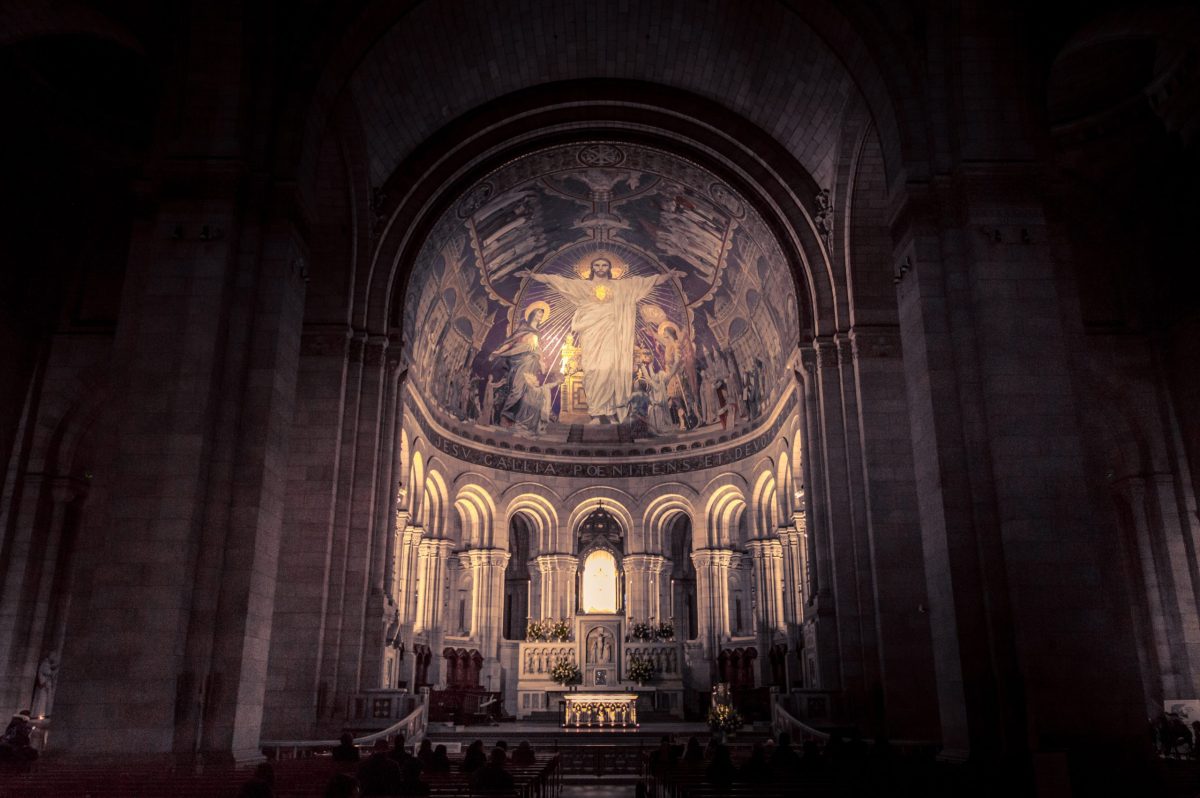By Amber Kinloch
“Catholic,” I think, is a tricky term to explain. We use it all the time in describing ourselves or the Church, but what do we really mean when we call it a mark of the Church?
The Baltimore Catechism No. 3 says: “The Catholic Church is catholic or universal because, destined to last for all time, it never fails to fulfil the divine commandment to teach all nations all the truths revealed by God.”
That’s a basic definition to start with, but there’s plenty more to unpack. Let’s take a look and draw out the practical sense of this theology.
What We Mean by “Catholic” or “Universal”
The Catechism of the Catholic Church tells us: “The word ‘catholic’ means ‘universal,’ in the sense of ‘according to the totality’ or ‘in keeping with the whole’” (CCC 830). Everything essential for our salvation is present in the Catholic Church, starting with Jesus Christ Himself. Jesus—i.e., God—is present fully as the head in this mystical body that is His Church. With Him present, we possess “‘the fullness of the means of salvation’ which He has willed” (CCC 830). We have full knowledge of the truths He taught as well as a full sacramental life. We are not missing any pieces of the Truth, as other churches are.
But this universality extends further. The Church is Catholic because she possesses the fullness of the Truth and because “she has been out by Christ on a mission to the whole of the human race” (CCC 830). This mission is given to the Apostles right before Jesus’ Ascension. He tells them: “Go, therefore, and make disciples of all nations, baptizing them in the name of the Father, and of the Son, and of the Holy Spirit, teaching them to observe all that I have commanded you” (Matthew 28:19-20). It is evident that Jesus’ Church is meant for all men in all times. No longer is salvation limited to the Jews. God has established a universal church!
Looking at Things in Practical Terms
You might be thinking, “That’s great, but what does all this mean for me?” Well, first we can be grateful for the Catholic Church and all the graces God bestows on us through her. We don’t need to bumble around in the dark groping for the Truth—as long as we believe and adhere to what the Church teaches, we possess it.
Now, that doesn’t mean you or I understand everything. But that’s okay. We all have much room for growth, and that growth will come if we are patient, trust God, and make a personal effort.
Our possession of the full Truth also leads to unity. In Protestantism, the emphasis is on personal interpretation of the Faith and Sacred Scripture. This leads to splintering factions and disunity. By contrast, while Catholics may have their disagreements, we maintain our essential unity. Why? It’s simple. We have a Magisterium—an authoritative teaching body, guided by the Holy Spirit—to look to. It can offer us definite answers on what we must believe, thus maintaining unity among all Catholics.
Furthermore, the Church’s unity is a visible unity. It’s not merely a spiritual one, as the Protestants claim. We know Christ intended the Church to be a public, physical Church. In Scripture, for instance, He talks about the matter of someone sinning against another. First, the injured party must try to settle the matter in private with his fellow believer. If that doesn’t work, he is to call in a couple of witnesses. If that doesn’t succeed, Jesus says to tell the Church about the matter (Matthew 18:15-17). This kind of public accountability doesn’t make sense in the case of a purely spiritual unity.
Beyond that, though, visible unity is a practical necessity. We’re human beings, creatures composed of body and soul. The spiritual is manifest in the physical. And so, we gather together on Sundays to worship the Lord. We celebrate the same Mass, even though we follow different rites and use different languages. We hold councils to sort out problems. In all this, we manifest our Faith to the world.
I hope you’re enjoying this series on the Marks of the Church. Next week, we’ll look at the last mark—“apostolic”—and why it matters.
Other Articles in this Series
- “Why the Marks of the Church Matter (Based on a Conversation with a Seventh-day Adventist)
- The First Mark of the Church: “One”
- The Second Mark of the Church: “Holy”

Amber Kinloch
Amber writes from the bunker of her living room. There she hunkers down with her laptop and a blanket while keeping an eye and ear tuned in to the activity of family life. Music set on loop keeps her energy flowing as she muses on the deeper happenings of ordinary life and what food to restock the fridge with.






Great article! I always look forward to them.
Quick thoughts – but not thought through:
When the Baltimore catechism says the church “never fails” the wording can easily be misconstrued. Obviously we both individually and corporately fail all the time. I believe what is meant is that the Church cannot fail to teach the truth. Thanks!
I’m glad you enjoyed the article!
Yes, the quote says that “[the Church] never fails to fulfil the divine commandment to teach all nations *all the truths revealed by God* [my emphasis added]”. I understand that to mean that we will: 1) Never hear the Church formally teach any heresy. 2) We will always be able to find the Truth in the Church, even if we have to search more intensively for it because our society’s values, the voices of false shepherds, etc., blur it.